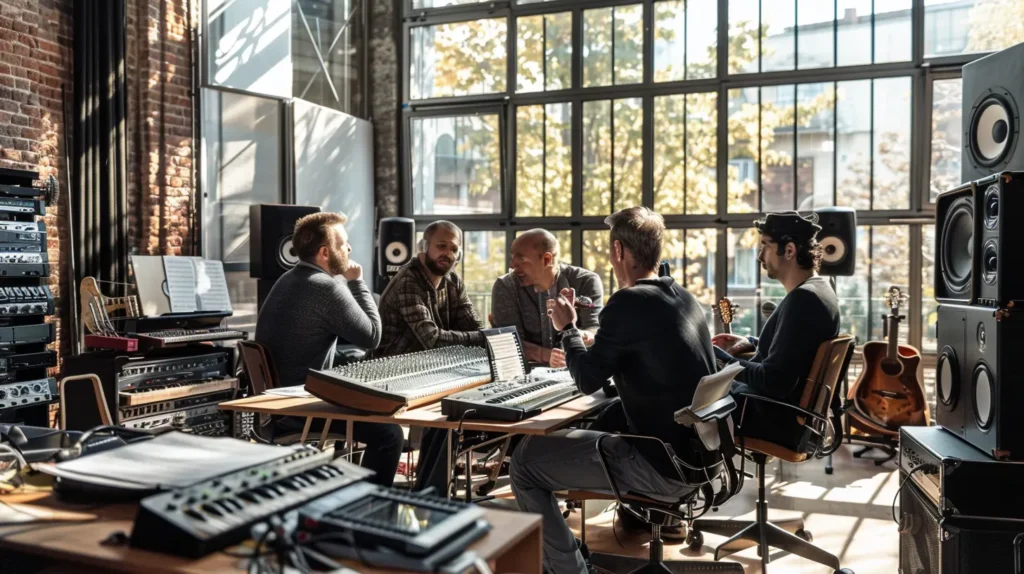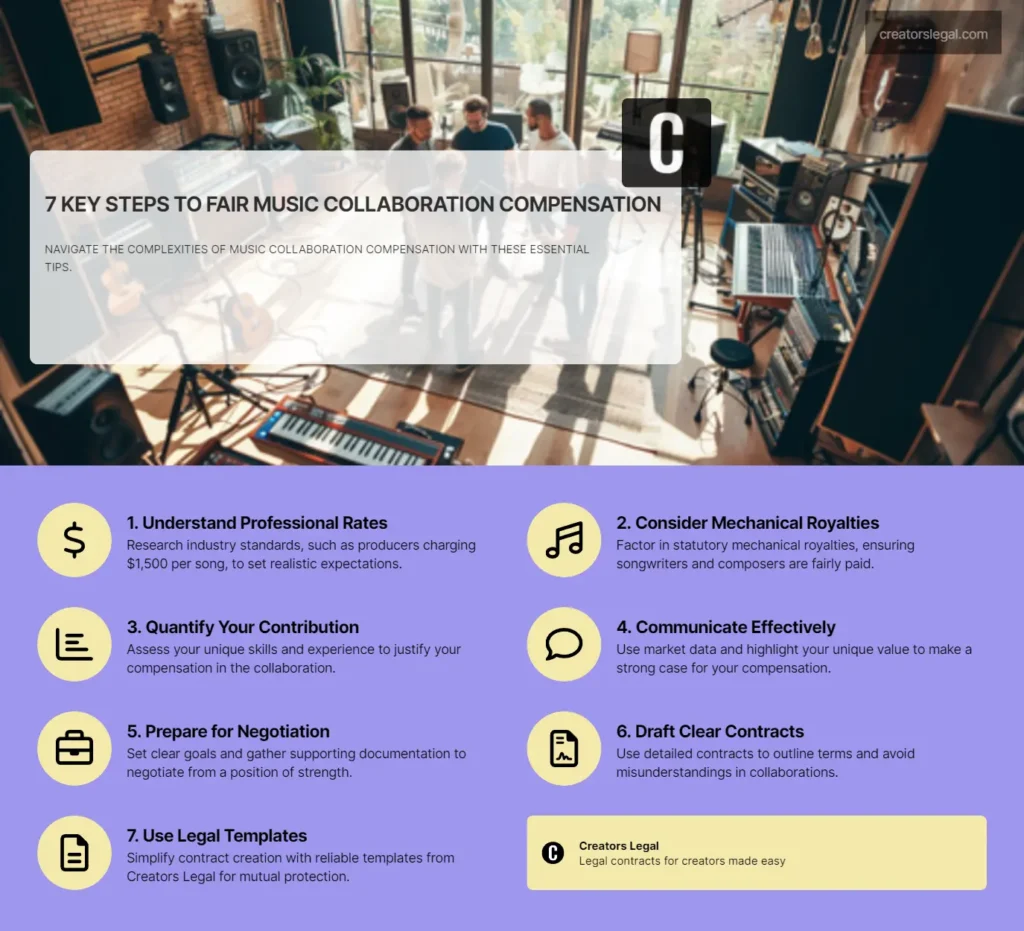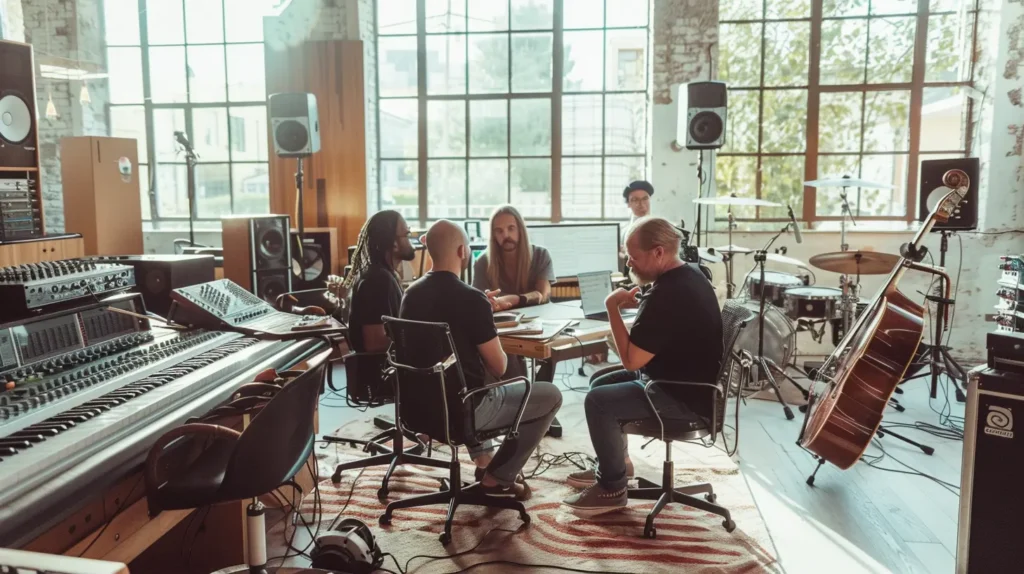To negotiate fair compensation in music collaborations can often feel like navigating a maze, but it’s a crucial step to ensure everyone involved feels valued and respected. How do you determine what your contribution is worth? What are the industry standards you should be aware of? These are just some of the questions we’ll explore as we break down the process of securing fair compensation.
Understanding market rates, leveraging your unique skills, and mastering effective communication are key components of successful negotiations. We’ll also discuss the importance of formalizing agreements using legal templates from Creators Legal, which can help clarify terms and protect all parties involved. Ready to take control of your music collaboration negotiations? Let’s get started!
Understanding the Importance of Negotiate Fair Compensation in Music Collaborations
Negotiate fair compensation in music collaborations is a foundation of professional respect and long-term relationships. When all parties feel fairly compensated, it fosters mutual respect and trust, which is crucial for ongoing collaborations. Conversely, inequitable compensation can lead to resentment and conflict, potentially jeopardizing future projects.
One of the common challenges in music collaboration negotiations is the disparity in perceived value. Independent producers, for instance, make an average of $122,357 annually, whereas indie musicians earn around $5,750 per year. This significant gap can create tension during negotiations, especially when both parties contribute equally to a project. Understanding these dynamics is the first step toward fair negotiations.
Researching Market Rates
Understanding Industry Standards

To negotiate fair compensation in music collaborations, it’s essential to be well-informed about industry standards. Independent producers typically charge around $1,500 per song or $500 per day for their services. Knowing these figures can help you set realistic expectations and avoid undervaluing your work. For indie musicians, the average annual income is significantly lower, which highlights the need for careful negotiation to ensure fair compensation.
- Independent Producers: $1,500 per song or $500 per day
- Indie Musicians: $5,750 per year
These figures provide a baseline for what you can expect to earn or pay in a collaboration. However, they should be adjusted based on the specifics of your project, including the complexity of the work and the experience of the collaborators.
Mechanical Royalties and Their Role
Mechanical royalties are another crucial component of fair compensation. In the US, these royalties are set by a statutory rate of 9.1 cents per song or 1.75 cents per minute, whichever is higher. These rates ensure that songwriters and composers receive a fair share of the revenue generated from their work. When negotiating, it’s important to factor in these royalties to ensure all contributors are adequately compensated.
Understanding how mechanical royalties work can also help you negotiate better terms. For instance, if your song is particularly long, the per-minute rate might be more advantageous. Being aware of these nuances can give you an edge in negotiations.
Assessing and Leveraging Your Contribution
Evaluating Your Unique Value

Before entering negotiations, take stock of your unique skills and experience. Are you an exceptional songwriter, a skilled producer, or a versatile musician? Quantifying your contribution can help you make a compelling case for fair compensation. For example, if you’re an independent producer charging $1,500 per song, you can justify this rate by highlighting your track record, technical skills, and the quality of your previous work.
- Skills: Songwriting, music director, production, musicianship
- Experience: Years in the industry, notable projects, beat licensing
- Quality: Technical skills, previous work
By clearly articulating your value, you can set the stage for a more balanced negotiation.
Communicating Your Worth
Effective communication is key to successful negotiations. Present your value in a way that resonates with your collaborators. Use market data to support your case, such as the average earnings of independent producers and indie musicians. Highlight your unique skills and experience, and explain how they contribute to the project’s success.}
For instance, if you’re an indie musician, you might point out that while the average income is $5,750 per year, your unique style and dedicated fanbase bring additional value to the collaboration. By framing your worth in terms of tangible benefits, you can make a stronger case for fair compensation.
Effective Communication Strategies

Preparing for Negotiations
Preparation is crucial for effective negotiations. Start by setting clear goals and expectations. What do you hope to achieve from the collaboration? What are your minimum acceptable terms? Having a clear understanding of your objectives can help you stay focused during negotiations.
Gather all necessary documentation and data to support your case. This might include market rates, examples of your previous work, and any relevant contracts or agreements. Being well-prepared can give you confidence and credibility during negotiations.
Negotiation Techniques
Effective negotiation requires a blend of active listening and empathy. Listen carefully to your collaborators’ concerns and try to understand their perspective. This can help you find common ground and build a more collaborative relationship.
- Active Listening: Pay attention to your collaborators’ concerns
- Empathy: Understand their perspective
- Compromise: Find common ground
By approaching negotiations with a mindset of collaboration rather than confrontation, you can create a more positive and productive environment.
Formalizing Agreements
Drafting Simple Contracts
Even for short-term collaborations, it’s important to formalize negotiate fair compensation in music collaborations with a contract. A live-venue performance contract, for example, should include key elements such as the date and time of the performance, payment terms, and any specific requirements or conditions. Clarity and detail are crucial to avoid misunderstandings and ensure all parties are on the same page.
- Key Elements: Date and time, payment terms, specific requirements
- Clarity: Ensure all terms are clearly defined
- Detail: Include all relevant information
A well-drafted contract can make your professional performance a more pleasant and rewarding experience.
Using Legal Templates
Using legal templates from Creators Legal can simplify the process of drafting contracts. These templates are designed to be easy to use and understand, even for those without legal experience. They can help ensure that all parties understand and agree to the terms, providing clarity and protection for everyone involved.
- Benefits: Easy to use, clear terms, protection for all parties
- Creators Legal: Reliable templates for various agreements
By using these templates, you can focus on your creative work, knowing that the legal aspects are taken care of.
Wrapping Up: Navigating Fair Compensation in Music Collaborations

Understanding how to negotiate fair compensation in music collaborations is essential for fostering professional respect and long-term relationships. By researching market rates, evaluating your unique contributions, and mastering effective communication, you can navigate the complexities of negotiation with confidence.
The disparity in earnings between independent producers and indie musicians underscores the need for careful, informed discussions to ensure all parties feel valued and fairly compensated.
Formalizing agreements with clear, detailed contracts is crucial to avoid misunderstandings and protect everyone involved. Using legal templates from Creators Legal can simplify this process, allowing you to focus on your creative work.
Remember, negotiate fair compensation in music collaborations isn’t about money—it’s about respect, trust, and the foundation for future collaborations. So, as you step into your next negotiation, consider this: Are you truly valuing your contribution and setting the stage for a successful, respectful partnership?






